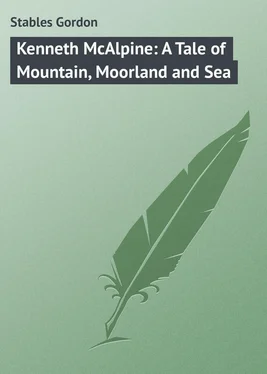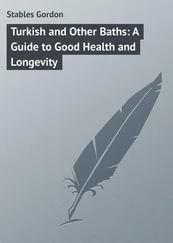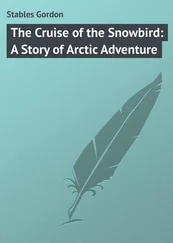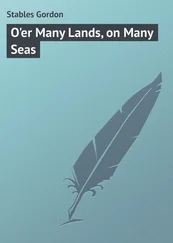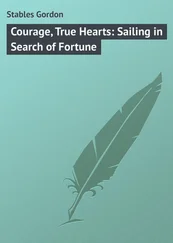Gordon Stables - Kenneth McAlpine - A Tale of Mountain, Moorland and Sea
Здесь есть возможность читать онлайн «Gordon Stables - Kenneth McAlpine - A Tale of Mountain, Moorland and Sea» — ознакомительный отрывок электронной книги совершенно бесплатно, а после прочтения отрывка купить полную версию. В некоторых случаях можно слушать аудио, скачать через торрент в формате fb2 и присутствует краткое содержание. Жанр: foreign_prose, на английском языке. Описание произведения, (предисловие) а так же отзывы посетителей доступны на портале библиотеки ЛибКат.
- Название:Kenneth McAlpine: A Tale of Mountain, Moorland and Sea
- Автор:
- Жанр:
- Год:неизвестен
- ISBN:нет данных
- Рейтинг книги:4 / 5. Голосов: 1
-
Избранное:Добавить в избранное
- Отзывы:
-
Ваша оценка:
- 80
- 1
- 2
- 3
- 4
- 5
Kenneth McAlpine: A Tale of Mountain, Moorland and Sea: краткое содержание, описание и аннотация
Предлагаем к чтению аннотацию, описание, краткое содержание или предисловие (зависит от того, что написал сам автор книги «Kenneth McAlpine: A Tale of Mountain, Moorland and Sea»). Если вы не нашли необходимую информацию о книге — напишите в комментариях, мы постараемся отыскать её.
Kenneth McAlpine: A Tale of Mountain, Moorland and Sea — читать онлайн ознакомительный отрывок
Ниже представлен текст книги, разбитый по страницам. Система сохранения места последней прочитанной страницы, позволяет с удобством читать онлайн бесплатно книгу «Kenneth McAlpine: A Tale of Mountain, Moorland and Sea», без необходимости каждый раз заново искать на чём Вы остановились. Поставьте закладку, и сможете в любой момент перейти на страницу, на которой закончили чтение.
Интервал:
Закладка:
“But one day, as poor Corbie was speakin’ and the bairns were listening wi’ round eyes and gaping mouths, who should appear on the scene but Corbie’s father?
“The laddie gave one low scream, like somebody in a nightmare. Then his father seized him, and oh! they say it was dismal to hear the howls of the poor laddie and the sound o’ the fearfu’ blows.
“Corbie didn’t appear again for many a day, but the human heart must have society, and by degrees Corbie commenced story-telling again, but no’ in the kirk-yard, only down in a thicket by the riverside, and always when there, some one was put to watch.
“I often passed that house, even at night, though the name it had now was worse and worse.
“I had used to have business at T – , across the hills.
“But so bad a name did that road get, that even by day the boldest would hardly venture to take the short cut to T – up along the laird’s march dyke. Belated travellers saw lights – dead candles they called them – flitting and flickering around the fairy knoll. Brownies and spunkies, they said, were met on the moor, and down by the riverside Kelpie himsel’ was often visible.”
(Kelpie, in Scotch folklore a kind of bogle, half man, half bat, often seen by midnight near the banks of ugly rivers. He lives in deep, dark pools.)
“A sturdy shepherd that had stayed too long at T – had met Kelpie, so they said; he was found next day cut and bleeding at the water-side, and was a raving maniac for weeks.
“One day I was setting out for the seaside village – I was young then, and strong – when near the clachan I met McCaskill.
“‘Can I trust ye,’ he said, ‘to deliver a letter at the Mill House?’
“I was feared to offend by refusing, so I took it. But lo! I forgot it a’thegither till I was coming hame. It was night, too, but deliver it I must.
“I took the road alang the auld march dyke across the hills. The moon was shining, but no’ very brightly, givin’ a feeble yellow kind o’ a licht through a haze o’ drivin’ clouds.
“Well, I was just near the dreariest part o’ the upper glen, and no’ far from the fairy knoll. I was wishing I were well past it, and away down to the clachan, where I could see the lights blinking cheerily from the houses among the trees.
“I was hurrying on, when suddenly, with an eldritch scream, something in white sprang from behind an etnach,” (juniper) “bush.
“I was a bold lass. Some would have fainted. My heart was in my mouth, but I felt impelled to throw myself at the thing, whatever it was. I rushed forward with a frightened shriek and grasped it. I wheeled its face towards the moon, and what think you saw I?”
“A brownie!” said Dugald. “Oh, Grannie, I’m all of a quiver.”
“He was no brownie. Only the auld, auld-fashioned face o’ little Corbie.”
“‘Let me go, Nancy. Let me go,’ he pleaded. ‘My father would kill me if he knew I was found out.’
“He wriggled out o’ my hands and fled, and I hardly felt the ground beneath my feet till I reached the low end o’ the glen and found myself opposite the gate o’ Mill House.
“Then I remembered the letter.
“Dare I deliver it?
“Dare I refuse? That would be worse. I took the road down through the willow thicket, and crossed the rickety auld plank bridge, and in two minutes I was in front of the house. There were sounds of singing and revelry from the inside; I knocked, but wasn’t heard. Knocked louder, and in a moment everything was dark and silent. The door opened. I was seized and dragged in. What I saw and heard at Mill House that night I was put on oath not to tell till all were dead or gone. I may tell you now – they were smugglers.”
“Thank goodness!” said Dugald, greatly relieved it was no worse. “Oh! Grannie, but you have a fearsome way o’ tellin’ a story.”
“For twa lang years they occupied that house, but during that time something happened that caused grief amang the village bairns. Corbie was missed. Weeks flew by, and he never came back. Then one day a thinly-attended funeral came winding towards the kirk-yard, carrying a wee bit coffin.
“The coffin was Corbie’s, and there were many tears and mickle sorrow amang the poor hunchback’s acquaintances, I can tell ye. His friends went awa’, and left poor Corbie in the mools, but the bairnies ne’er forgot the grave, and mony a bonnie wreath o’ buttercups and gowans did they string and put on it in the sweet summer-time.
“Well, laddies, the Mill House was found deserted one day. The smugglers had gone as quietly as they had come. But the house kept its bad name, and so did the hills above it; and so my story ends.”
“Not quite,” said Dugald. “Did the brownie never come again, or the kelpie? Were the dead candles seen nae mair?”
“No,” said Kenneth; “don’t you understand? The brownie was the poor boy, Corbie; the kelpie was a smuggler; and the dead candles the lights seen at night near the cave in the fairy knoll. That was the place where they carried on their sinfu’ trade.”
“I see things clearly enough noo,” said Dugald; “and I’ll no’ be feared to cross the muir. Ah, well, Grannie, you have relieved my mind.”
“I’m glad o’ it, laddie. Now will Grannie take down the good Book and read a bit?”
Grannie did.
The talk now took a cheerier turn. Old Nancy, knowing how painfully superstitious Dugald was, refrained from introducing anything more in the shape of either brownie or spunkie. And so a pleasant hour was spent, till the old “wag-at-the-wa’” pointed to the hour of twelve, and warned Kenneth and his friend it was high time to commence retracing their steps across the moor.
Chapter Four
Gloaming in the Glen – Kennie’s Cave
“Gloaming o’er the glen is falling;
Little birds have ceased to sing,
Flowerets now their petals faulding
As night descends on dewy wing.”
Scene: Half-way down the glen, where heather and patches of tilled land end, and woodland commences. Where the stream goes wimpling and swirling round the boulders, underneath the rustic bridge.
At the corner, where, after crossing the bridge, the road takes a bend, and is soon lost in the gloom of overhanging foliage, Kenneth is seated on a stone.
At his feet lies Kooran, looking very knowing, because he has got his ears pricked up, and his eyes very wide open, and his head thoughtfully turned a little on one side.
Kooran knows that his master has come there to meet his friend the Highland keeper, and that the retriever Shot will be with him, but the keeper may come down from the brae-land on the right, or up the road from the wood, or he may suddenly appear on the cliff top, after fording the stream and climbing the rocks.
No need for Kenneth to listen; he has only to watch Kooran.
No sound can deceive Kooran. He will not move from that position till the right moment.
Not far from Kooran’s extended tail, a field-mouse begins to sing a little song. She is hidden in under the dry moss, through which she has driven all sorts of smooth round tunnels, for quite an engineer is the field-mouse, and the only wonder is she ever finds her way back again to her nest, through such a labyrinthic network of half-lighted lanes.
“Beet-ee-beet-ee-beet-ee-ee-beet-ee.” So goes her song.
Kooran never moves his head; all he does is to turn one ear back towards his tail for a moment, but only one ear.
“I hear you,” he seems to say. “Sing away, my pretty one you know I’m busy, but wait a wee till Shot comes. Shot and I will soon have you out of there. My eyes! won’t we make the turf fly!”
A great bird flies right over a tree, but turns sharply in the air and flies back affrightedly. It was a moor-cock, but he didn’t know any one was there. He has to take another road home.
Читать дальшеИнтервал:
Закладка:
Похожие книги на «Kenneth McAlpine: A Tale of Mountain, Moorland and Sea»
Представляем Вашему вниманию похожие книги на «Kenneth McAlpine: A Tale of Mountain, Moorland and Sea» списком для выбора. Мы отобрали схожую по названию и смыслу литературу в надежде предоставить читателям больше вариантов отыскать новые, интересные, ещё непрочитанные произведения.
Обсуждение, отзывы о книге «Kenneth McAlpine: A Tale of Mountain, Moorland and Sea» и просто собственные мнения читателей. Оставьте ваши комментарии, напишите, что Вы думаете о произведении, его смысле или главных героях. Укажите что конкретно понравилось, а что нет, и почему Вы так считаете.
